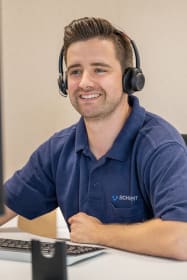
Michael Döring (right), Head of Schubert Motion in Dresden, and Florentin Rauscher (left), Optimisation and Control Engineer, will be showing robots featuring Schubert Motion technology for the first time at the FACHPACK 2021 trade fair.
Organic movements are faster
Robots have until now been programmed to travel the shortest possible straight paths. This is not the best solution from a physical point of view, however, because the mechanical loads on arms and joints are increased by abrupt acceleration and braking manoeuvres. A slightly curved track, on the other hand, allows for smoother changes in speed and therefore, paradoxically, faster processes. A further advantage is that the more organic movements reduce vibrations on the robot and in the machine, as this is also part of the development work.
The entire system is therefore subjected to less stress, which benefits process accuracy, product protection and system longevity – promising considerable advantages for Schubert customers. Michael Döring explains: “In the future, with our software we will be able to specifically address individual causes of vibration, such as soft floors, and still produce quickly.” A single figure highlights the advantage the new programming with Schubert Motion delivers: With optimum control, the same robot can work on average around 20 per cent faster – without manual readjustment. Thanks to the Schubert Motion software, packaging machines can be operated at significantly higher cycle rates, enabling manufacturers to efficiently increase their production.
Development fields: predictive maintenance and simulation
In addition to robot optimisation, Michael Döring’s team in Dresden now wants to drive forward the topics of predictive maintenance and simulation. The expansion of the Dresden site is therefore making progress. The environment at Schubert Motion is excellent for interested developers and pioneering digital innovations in the field of robotics: impressive technology, a new office close to the Technical University of Dresden and, last but certainly not least, a highly qualified and committed team.


